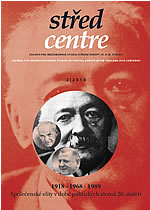Tělo, židovství, bolševismus a český nacionalismus (1918–1920)
Body, Jewishness, Bolshevism and Czech Nationalism (1918–1920)
Author(s): Vít StrobachSubject(s): History
Published by: AV ČR - Akademie věd České republiky - Masarykův ústav
Keywords: Interwar Czechoslovakia; Czech nationalism; Judeo-Bolshevism; Communism
Summary/Abstract: The study focuses on a situation, when the nationalistic narrative tried to cope with the plot of the break-up of the post-war Czechoslovakia’s “national unity”, i.e. with the opposition expressed by a great part of the Czech public against the nationalistic project of the national state. As a catharsis technique, the narrative made use of the Judeo-Bolshevism, a foreign and incongruous element that had to be removed. The Judeo-Bolshevism was a part of the nationalistic narrative emphasizing the nation’s organic integrity and homogeneity, as opposed to the concept of class solidarity. Its importance lay not only in the exclusion of a certain social group behind the edge of the presented national society (national body). Discovery, or better to say, re-discovery of race striving for power was particularly to assist the national society in integrating itself and removing everything that did not correspond to the nation’s interests. The organism and body were becoming the central metaphors of texts, mimetic depiction of the “national unity” and the assumed/required conduct of its parts. Communism, as viewed by the nationalistic narrative, was losing its legitimacy, stepping over the borders of the presented national society and threatening with the break-up of its strong (nationalistic) identity. The Judeo-Bolshevism, as a stigmatization of an alternative order (communism), assisted in legitimizing the policy of “all-national” interests and in excluding its opponents.
Journal: Střed. Časopis pro mezioborová studia Střední Evropy 19. a 20. století
- Issue Year: 2/2010
- Issue No: 2
- Page Range: 23-53
- Page Count: 31
- Language: Czech

